
This post may contain affiliate links or sponsored content. That means if you click on my link and buy something, I will earn a small commission from the advertiser at no additional cost to you. For more information on this, please click here.
This cozy Vegetable Lasagna with Bechamel is packed with mushrooms, spinach, a creamy white sauce and lots of delicious fontina and pecorino cheeses. It’s delicious, comforting, hearty and a real crowd pleaser–everything you could hope for in a lasagna!

When you’re entertaining family or friends, it’s always a great idea to have some tried-and-true recipes that you can serve a crowd.
And, since almost everyone loves lasagna, this recipe is perfect for both entertaining and weekend family meals. It’s especially great for holiday dinners, like Easter and Christmas, along with this baked spiral ham with Marsala wine glaze.
Unlike my beloved Italian-American lasagna made with tomato sauce, mozzarella and ricotta cheese, this white Vegetable Lasagna has a creamy béchamel sauce, rich fontina cheese, spinach and lots of sautéed mushrooms. It’s inspired by my classic French culinary training, my travels to northern Italy and France as well as the two years I spent in the French-speaking part of Switzerland, where creamy sauces and cheese generally reign supreme!

What Exactly is Béchamel?
A béchamel sauce is a smooth and creamy, milk-based white sauce that is thickened with a roux (flour + fat). It’s the foundation for lots of other sauces, like cheese sauces, and is known as one of the five “mother sauces” in French cooking. However, although it is super-prevalent throughout French cooking, bechamel sauce actually comes from Tuscany, where it was originally known as salsa colla (i.e., glue sauce) because its main function was as a binding element in pasta and vegetable dishes. It’s now referred to as besciamella sauce in Italian.
Although it takes some time to prepare the ingredients and build the layers, this lasagna recipe can be assembled in advance and held in the refrigerator for up to two days before baking it, making it a great option for a busy day or a meal where there is lots of other prep.
And, all it really needs is a light green salad to accompany it.
Vegetable Lasagna with Bechamel really is true comfort food! Enjoy this recipe at your next dinner party or special occasion meal and get ready for the silence that comes as everyone takes their first bite and experiences pure taste delight!

Ingredients for Vegetable Lasagna with Bechamel
Here are the ingredients we will be using to make this delicious lasagne with white sauce:
- Mushrooms, Spinach and Garlic: Almost any mushroom, or an assortment, can be used. I love to use cremini mushrooms, which are basically baby portobello mushroom and have a ton of flavor. White mushrooms work perfectly as well. And, while I suggest frozen spinach in this recipe for convenience, you can, of course, use fresh spinach. Be sure to strain out as much excess liquid as possible from all the cooked vegetables. (Excess liquid will create a soggy lasagna.)
- Lasagna Pasta Sheets: Fresh or dried lasagna can be used. Note that I have not tested this recipe with no-boil noodles.
- Milk, Butter, Flour: These ingredients are the foundation of the creamy white béchamel sauce. Use whole milk, real butter (not margarine) and all purpose flour. Butter is also used to sauté the garlic and mushrooms. If you prefer to not use butter, I suggest olive oil.
- Onion, Bay Leaves, Cloves, Nutmeg: These four aromatics are infused into the milk used to make the béchamel. They all add subtle, but distinct, flavor.
- Fontina Cheese: I used fontina val d’aosta cheese, which has a dreamy nutty, fruity and earthy finish that works beautifully with the mushrooms and spinach. Gouda, Gruyere, Taleggio and Edam are all acceptable Emmenthaler substitutes for fontina.
- Pecorino Romano Cheese: Sharp and salty Pecorino cheese is used both to season the white sauce and in between the lasagna layers for richness and flavor. You can substitute it with grated parmesan cheese if desired.
A complete and detailed list of ingredients with amounts and instructions is included in the recipe below.
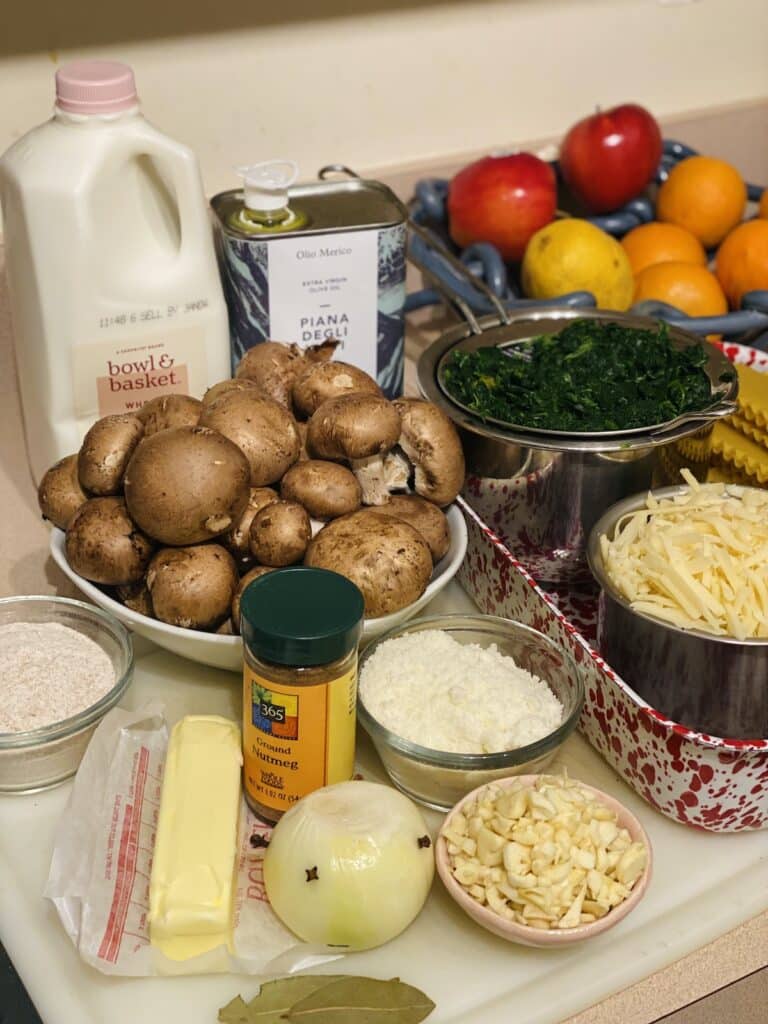
Vegetable Lasagna with Bechamel, Step-by-Step!
Here are the main steps for making this delicious baked pasta recipe:
- Gather and prep all ingredients. Bring a large pot filled with water to a boil for the pasta. Grease a baking dish thoroughly with butter or cooking spray and set aside.
- PRO-TIP: This recipe calls for a 9”x13” pan or baking/casserole dish that should be about 2.5” deep to hold all the layers. If necessary or desired, use a larger pan for less layers or break this up into two smaller pans. I have a friend that swears by making lasagna in a loaf pan, which is a great idea!

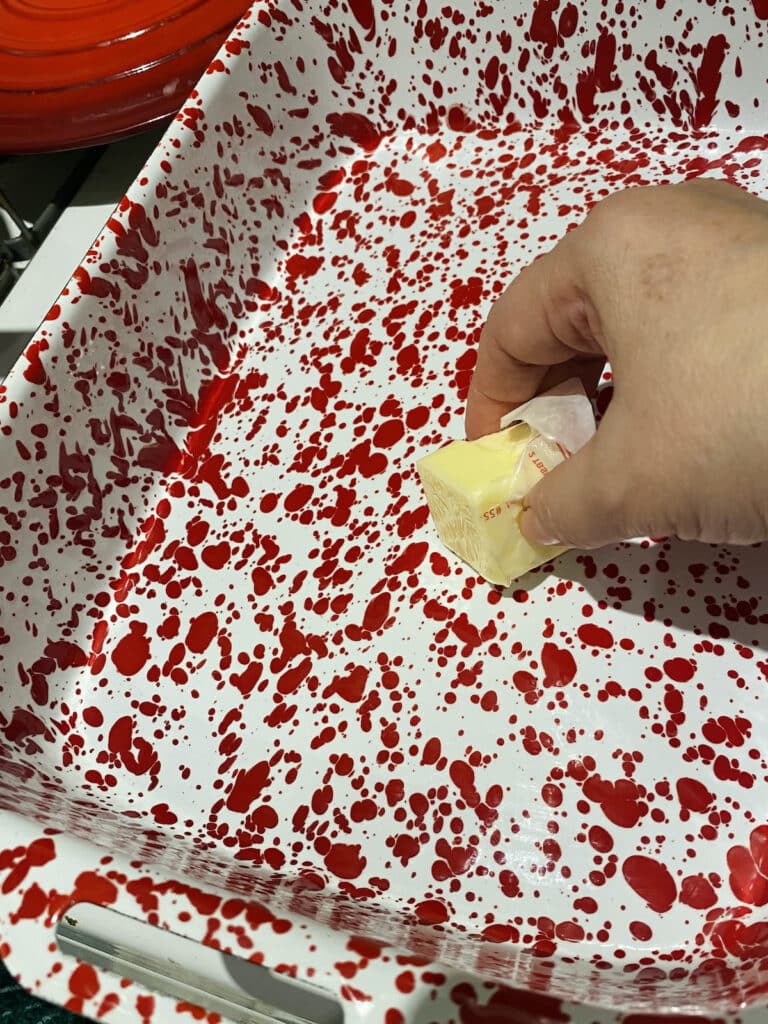
- Then, prep the veggies: Sauté the garlic in butter, then the mushrooms in batches until they are tender and dry.
- Mix the cooked mushrooms with the defrosted and squeezed-dry spinach and set aside.
- PRO-TIP: Strain out any residual liquid after this mixture sits. Excess liquid will make it difficult for the cooked lasagna to set properly.
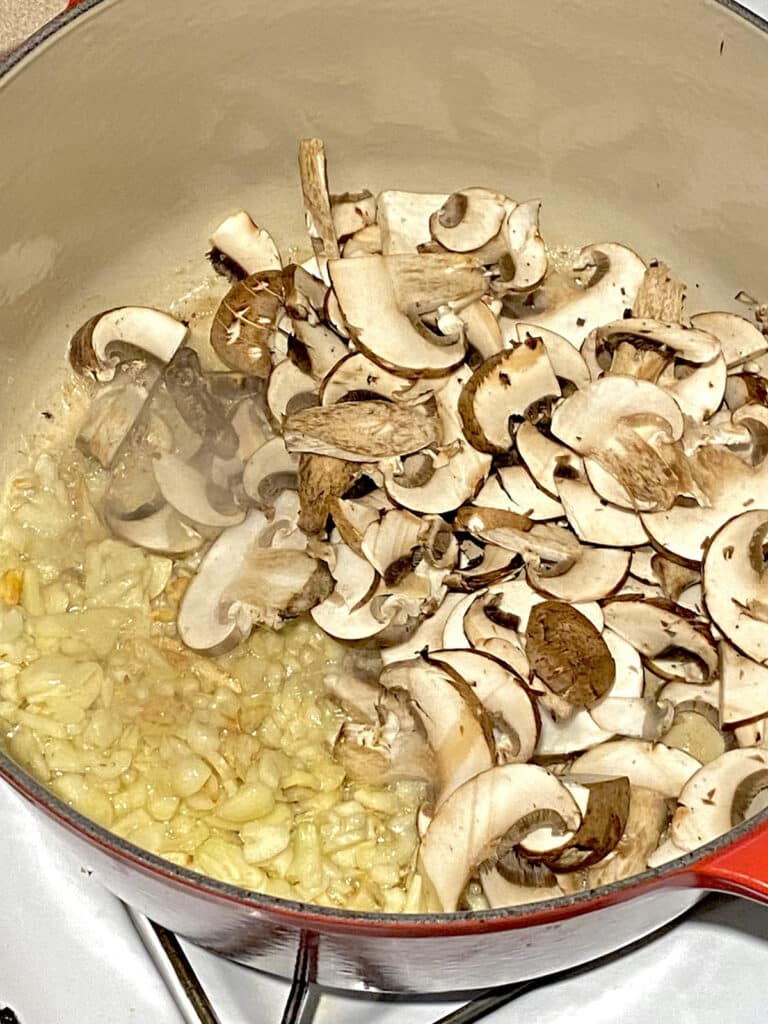

- Next, prepare the béchamel/white sauce: Make a roux by melting butter in a Dutch oven or heavy-bottomed pot over medium heat. When the butter has melted, quickly whisk in the flour to incorporate and continue to stir/whisk for about 2-3 minutes until it develops a frothy, bubbly appearance and the floury taste has been cooked off.
- PRO-TIP: Do not let the roux brown. It should remain “blond”.


- Pour in the milk, bay leaves and nutmeg and reduce the heat to medium low. Stick the cloves into the onion and carefully place the onion in the milk. Bring the mixture to a simmer and let it simmer for about 15-20 minutes to allow the sauce to thicken. Stir regularly to prevent lumps, taking care not to burn it.
- PRO-TIP: The milk does not need to be heated before adding it to the roux. It is proper technique to add a cold liquid to a hot roux.
- Once the milk is thick enough to coat the back of a spoon, remove and discard the onion and bay leaves and use a skimmer to remove any lumps.

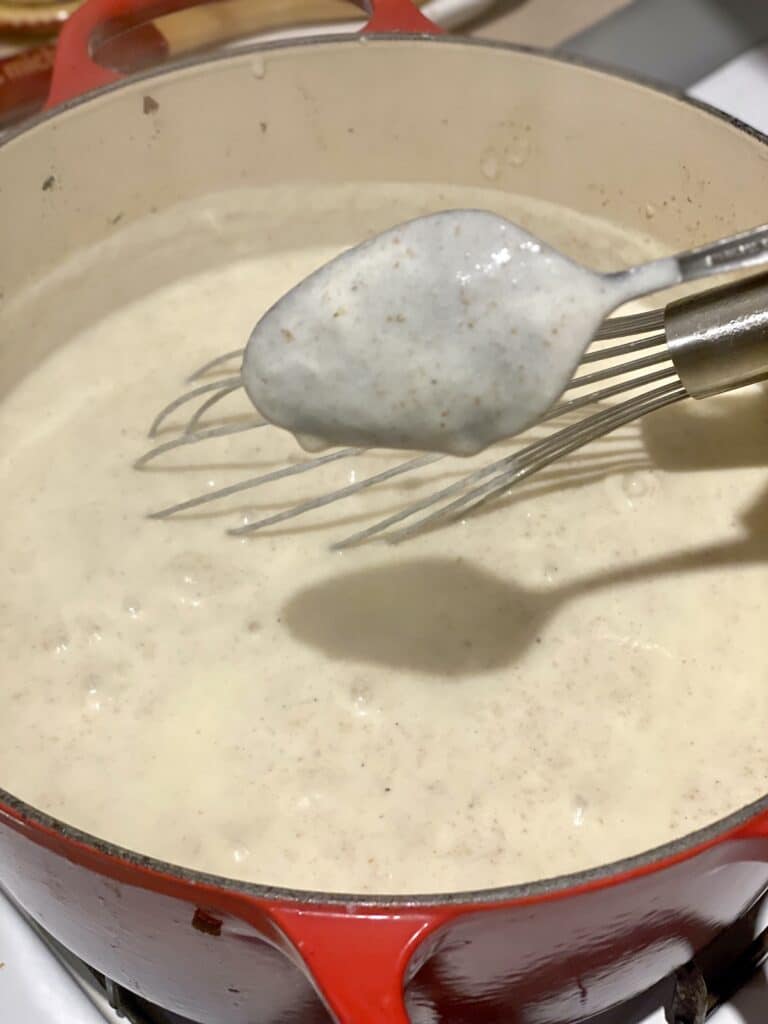
- Turn the heat off and whisk in the Pecorino cheese, along with a pinch of salt and pepper. Set aside.
- Boil lasagna noodles in salted boiling water with a splash of olive oil until 3 minutes less that the package directions. Then, drain the noodles very well, then lay them flat in a single layer on a sheet pan. Spray them with a bit more oil and set them aside.
- PRO-TIP: While I would almost never suggest adding oil to pasta water (since it reduces the adherence of sauce to pasta), this is one of the only exceptions for it. Long, flat pasta, such as these lasagna noodles, have a tendency to stick together when they cook and rest and the oil will help prevent that.
- PRO-TIP: You will likely have some breakage and this is ok. Keep these pieces as they will come in handy to patch the layers of lasagna.


- Next, assemble the white lasagna. Gather the greased baking pan, white sauce (give it a stir), cooked lasagna sheets, spinach/mushroom mixture, and the grated fontina and Pecorino cheeses.

- Assemble the lasagna in layers as follows, each component being spread out over the entire surface of the layer before it:
- Spread about 1 cup white sauce over the bottom surface;
- Then add 4-5 lasagna noodles;
- Then about 1 cup white sauce again;
- Then about heaping ½ cup spinach/mushroom mixture;
- Then about heaping ½ cup grated fontina cheese;
- Then a pinch of grated Pecorino.


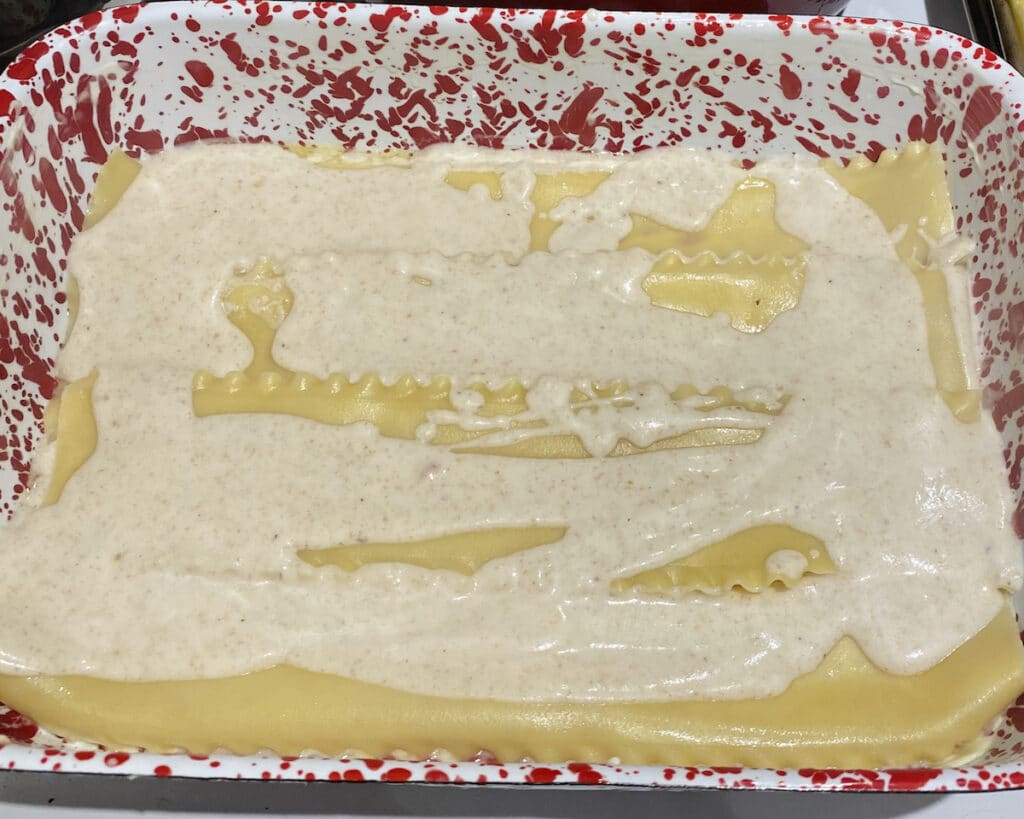

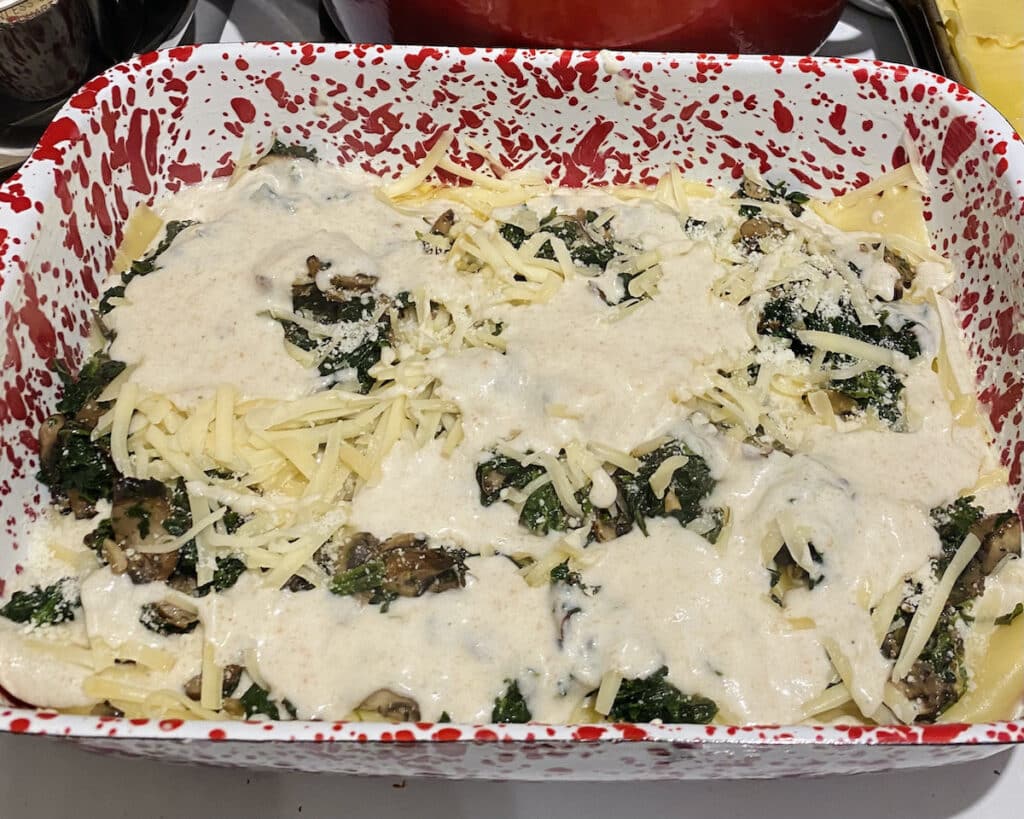
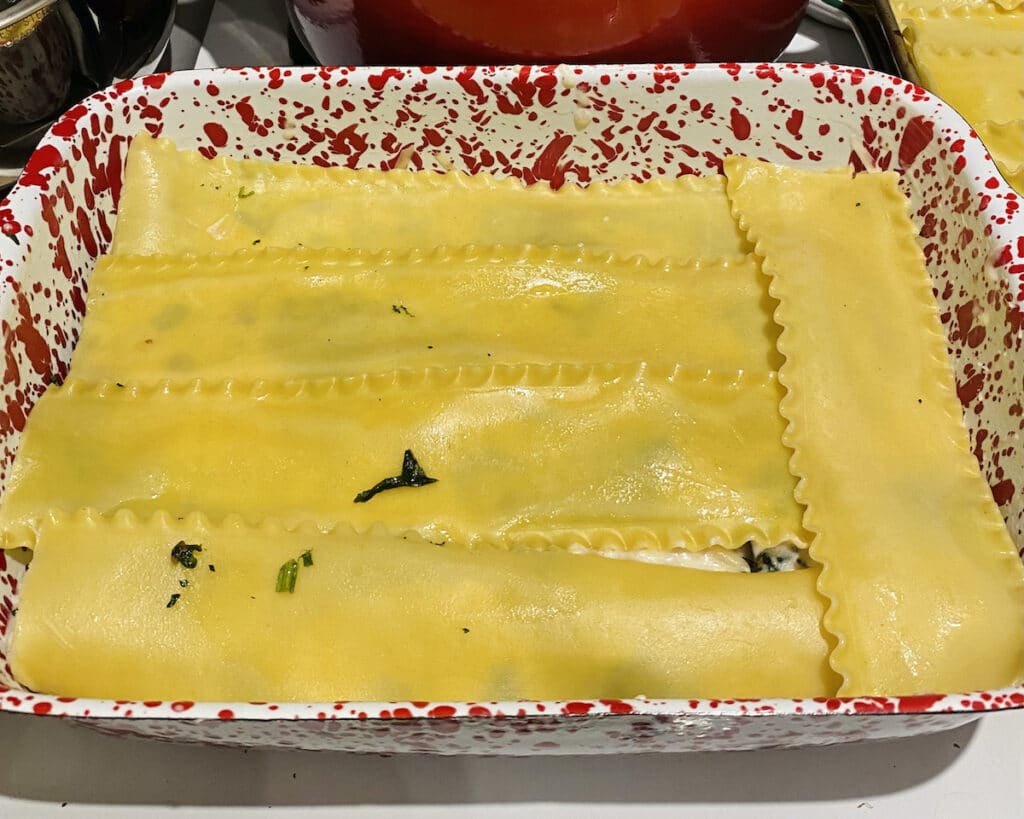
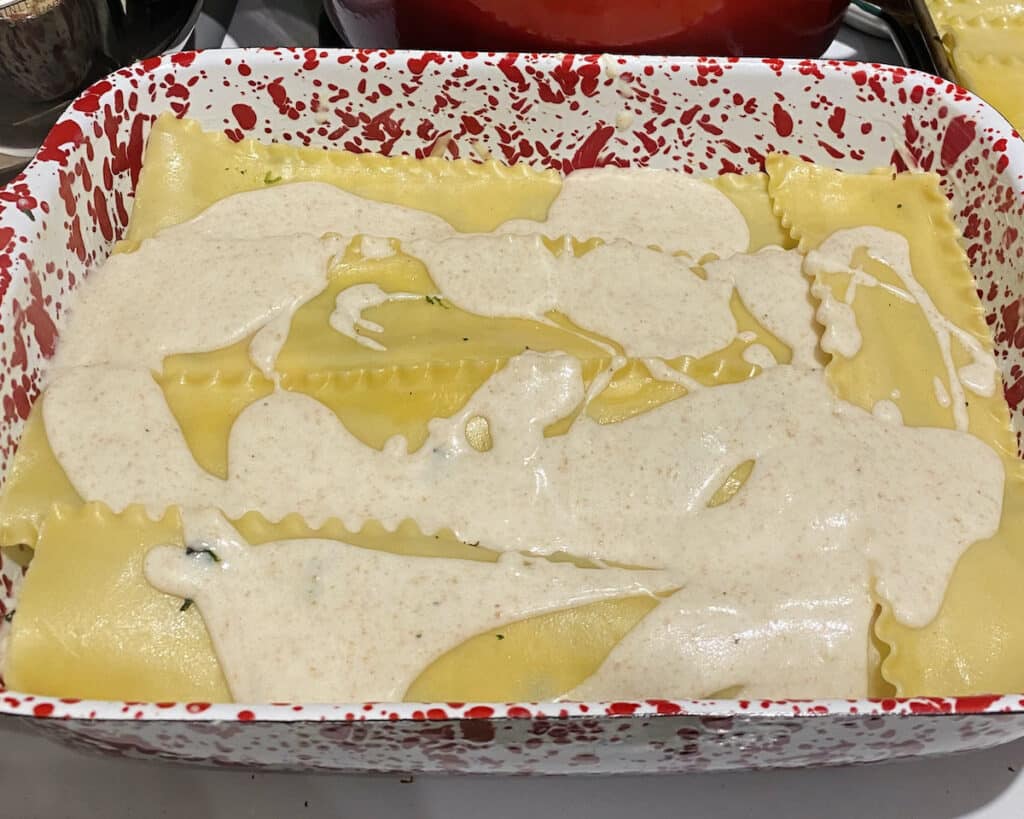
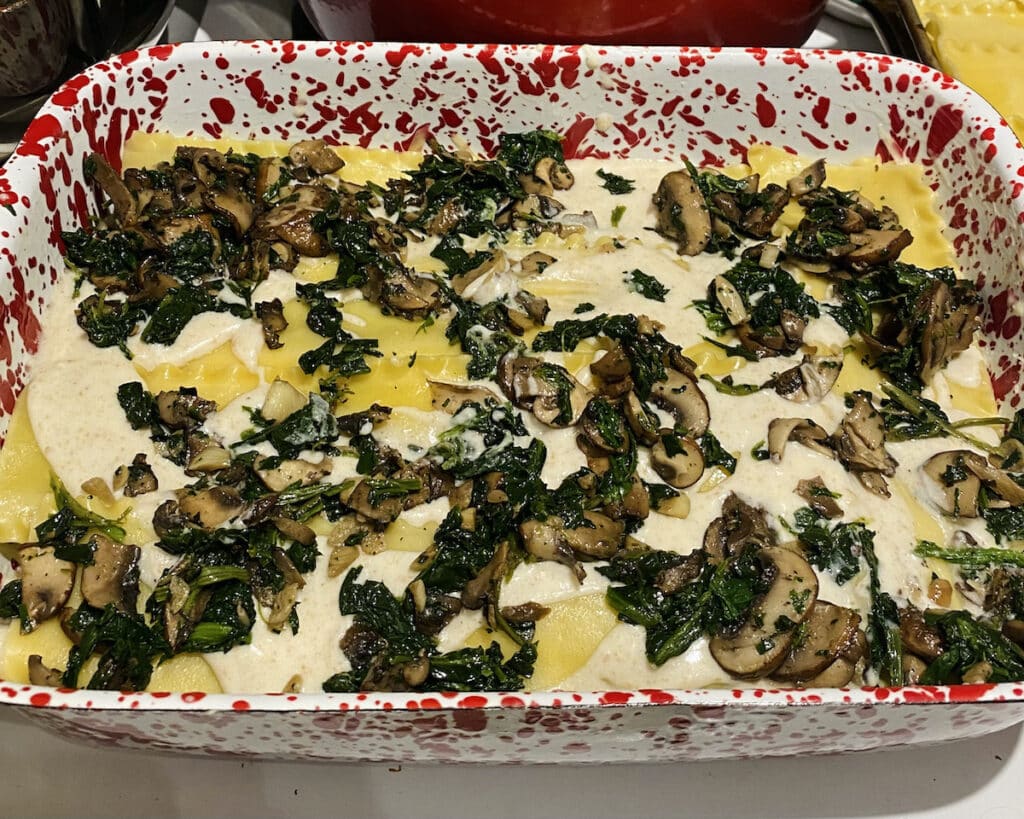
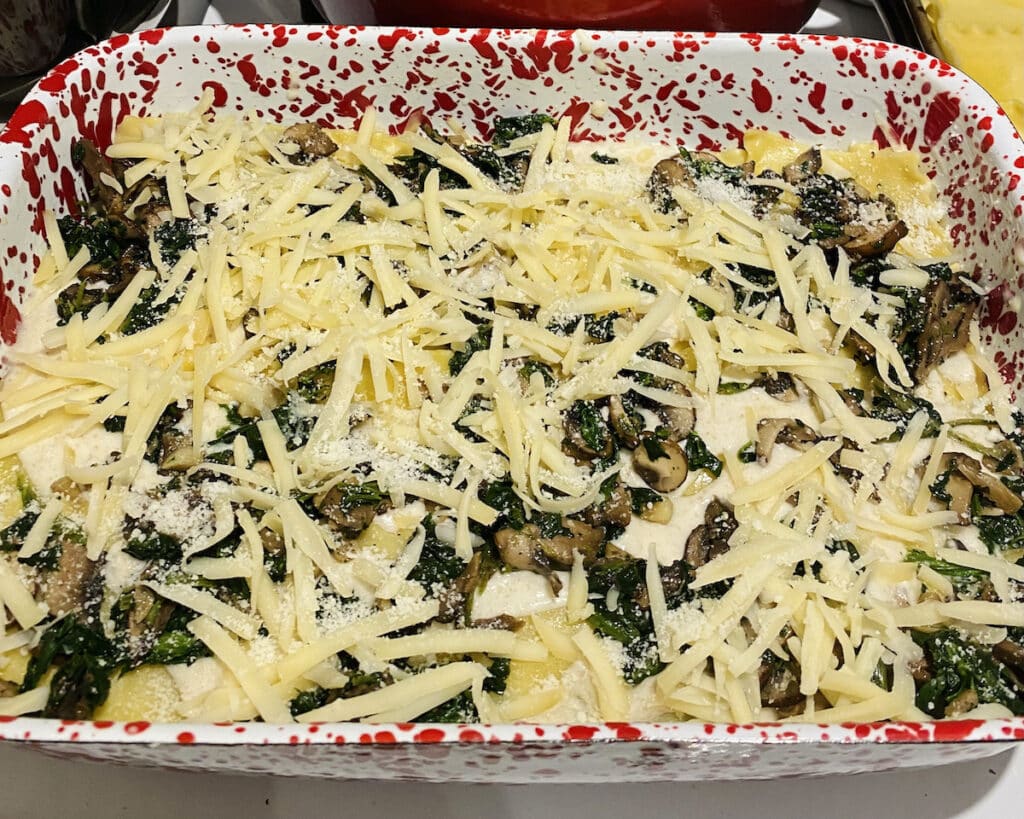
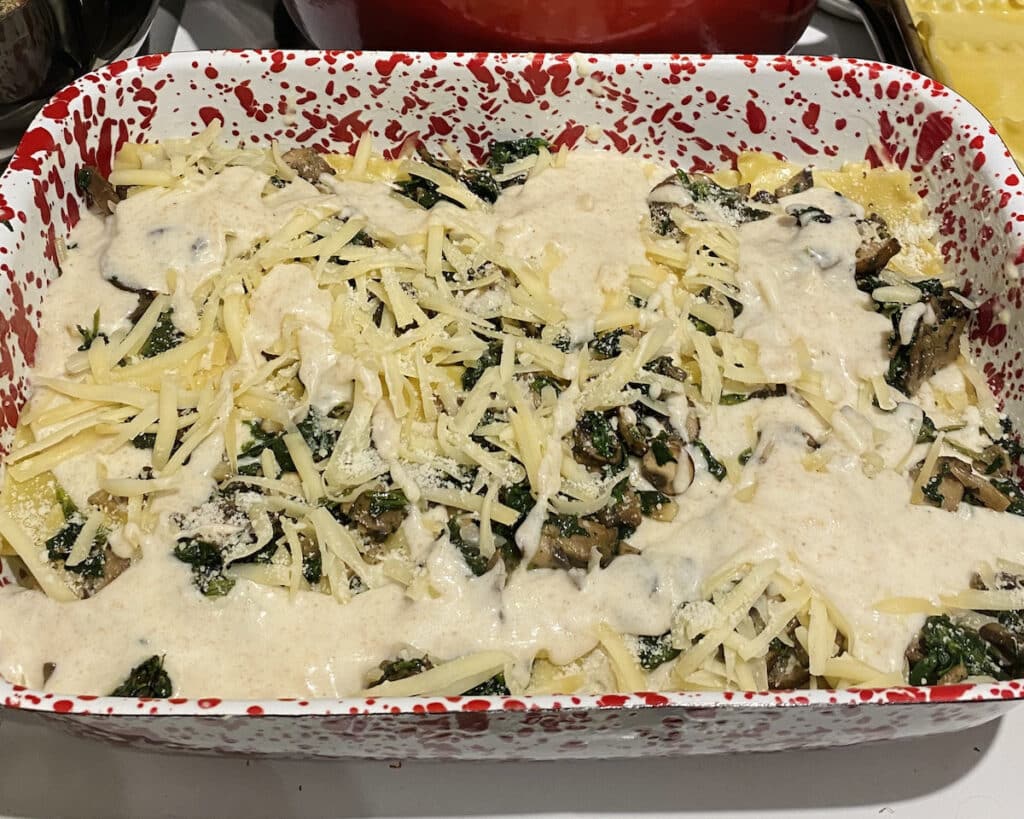

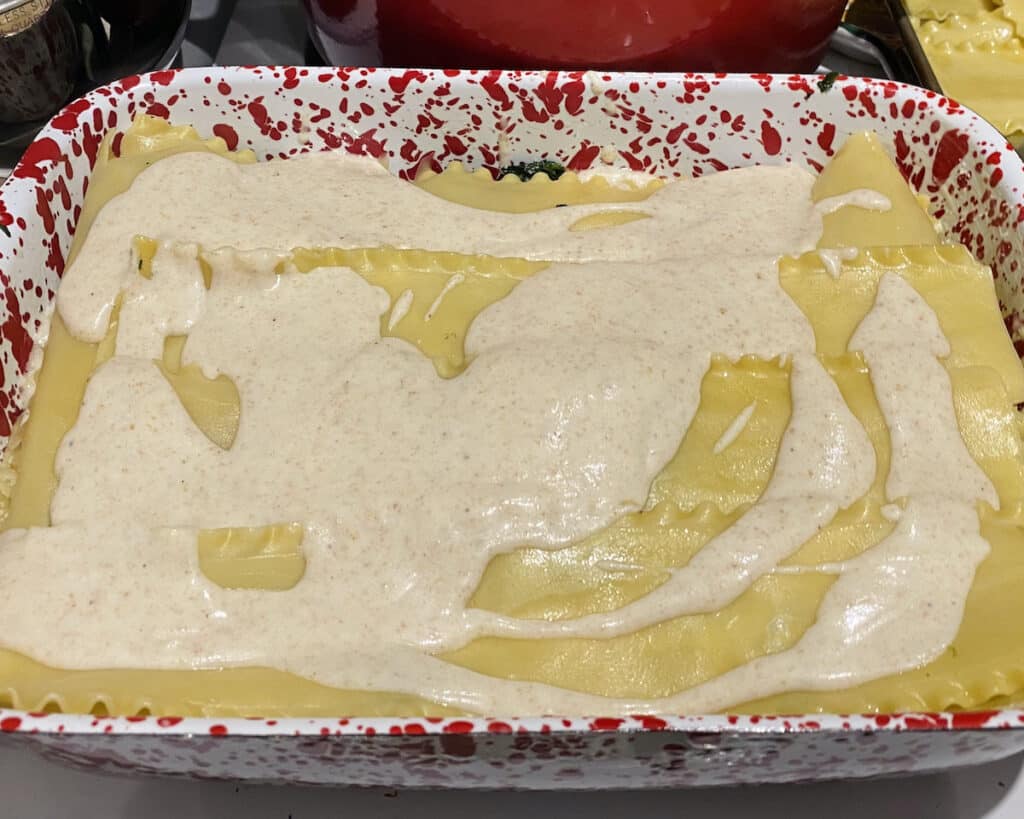


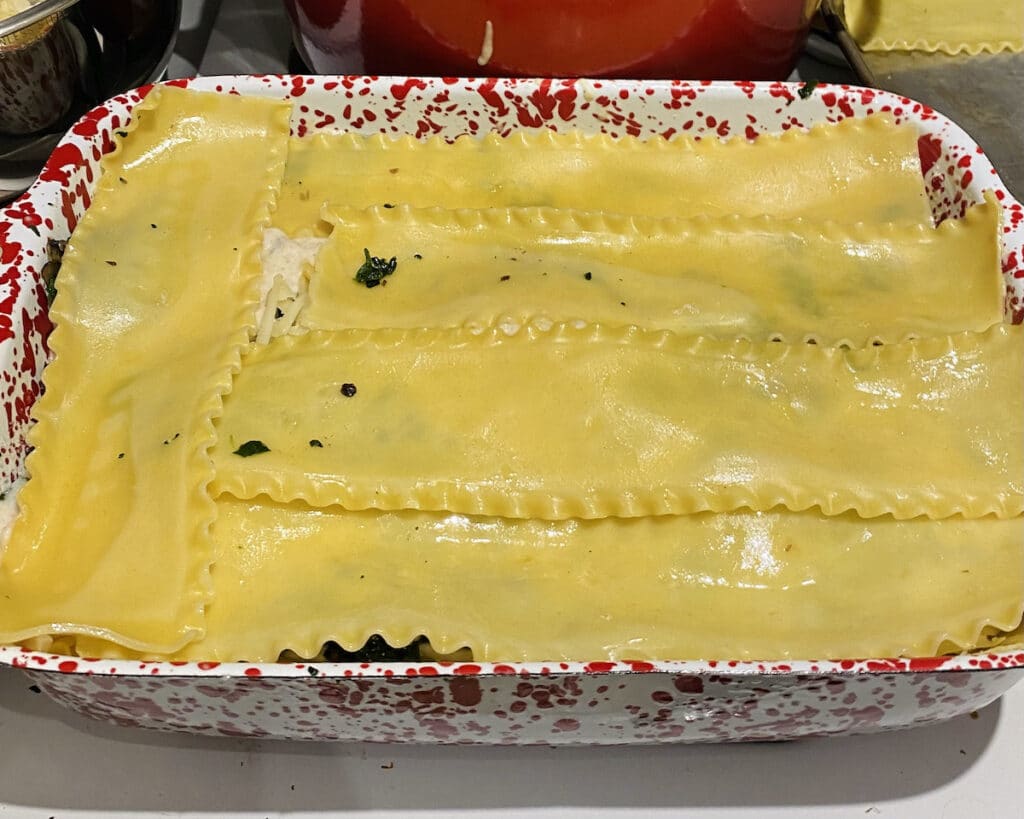
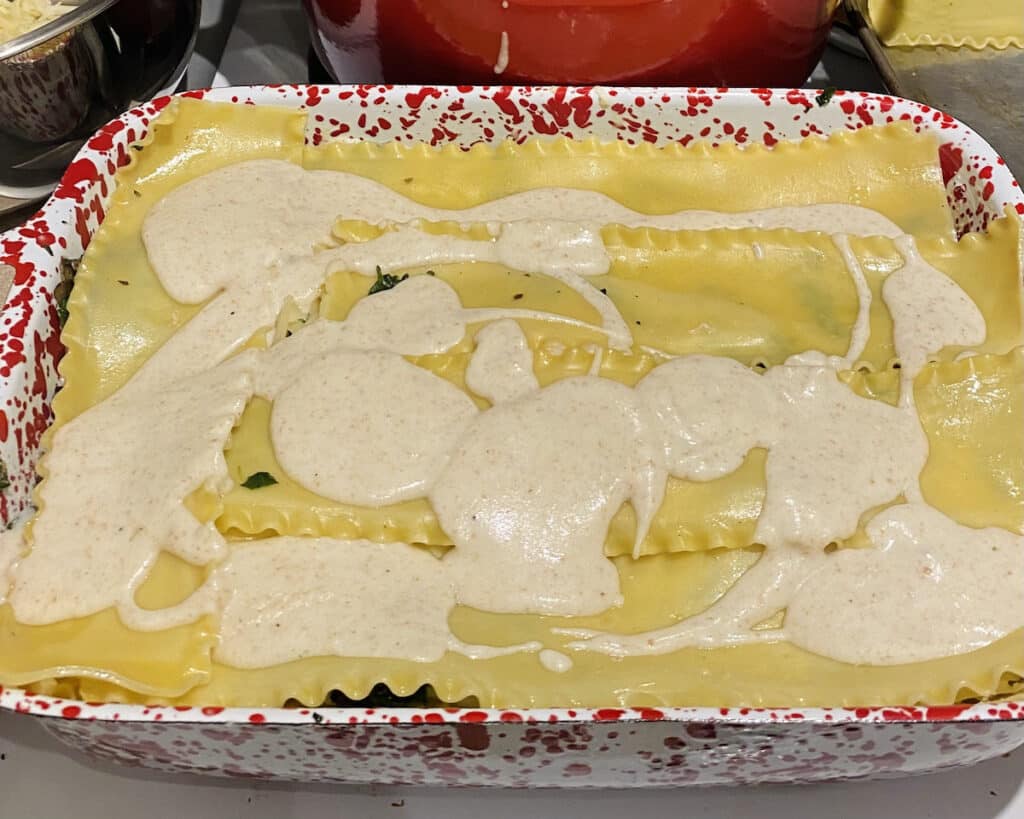
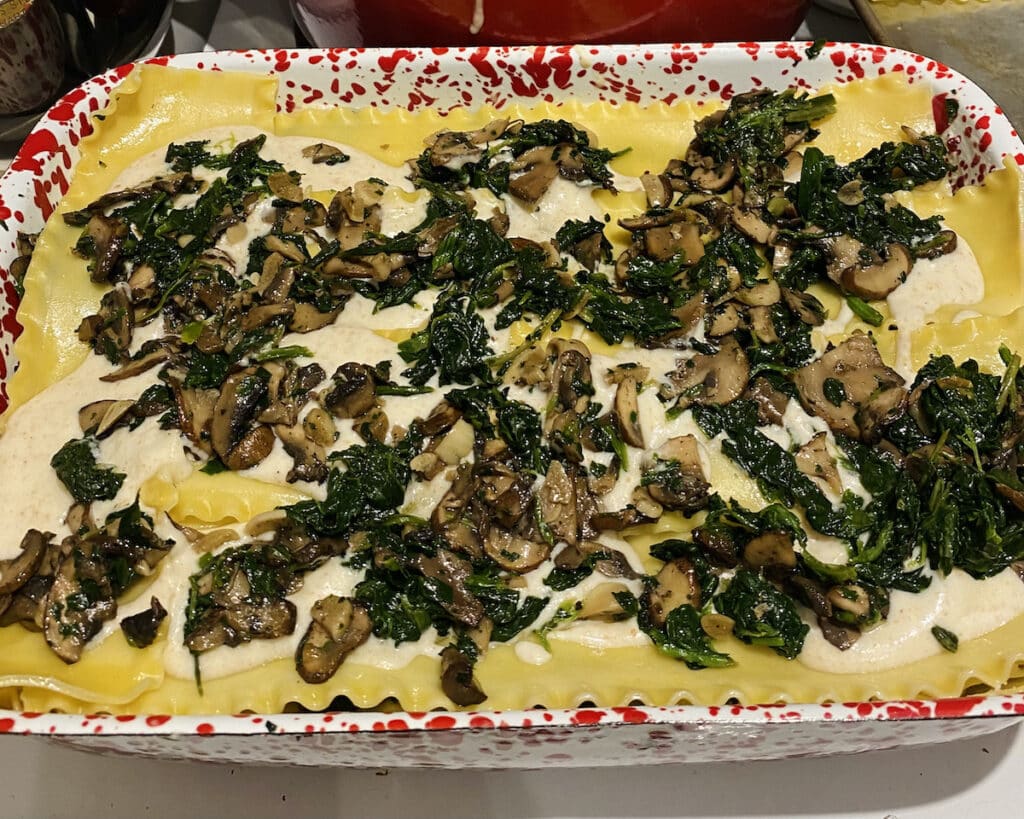


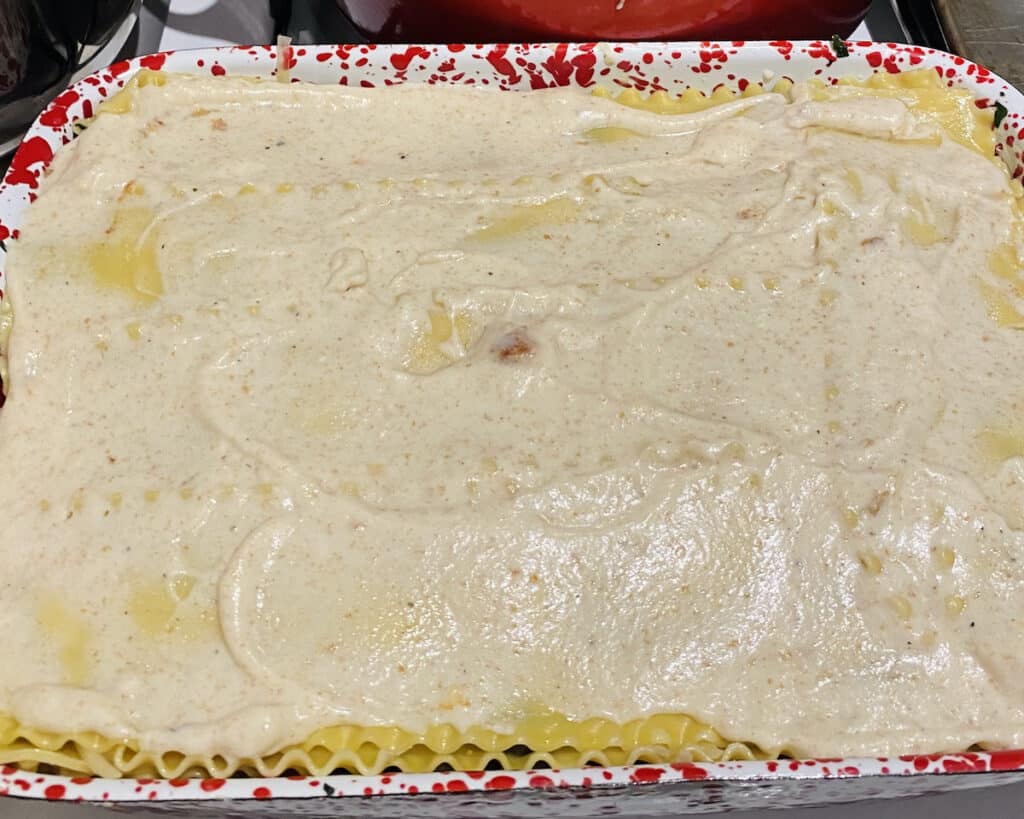
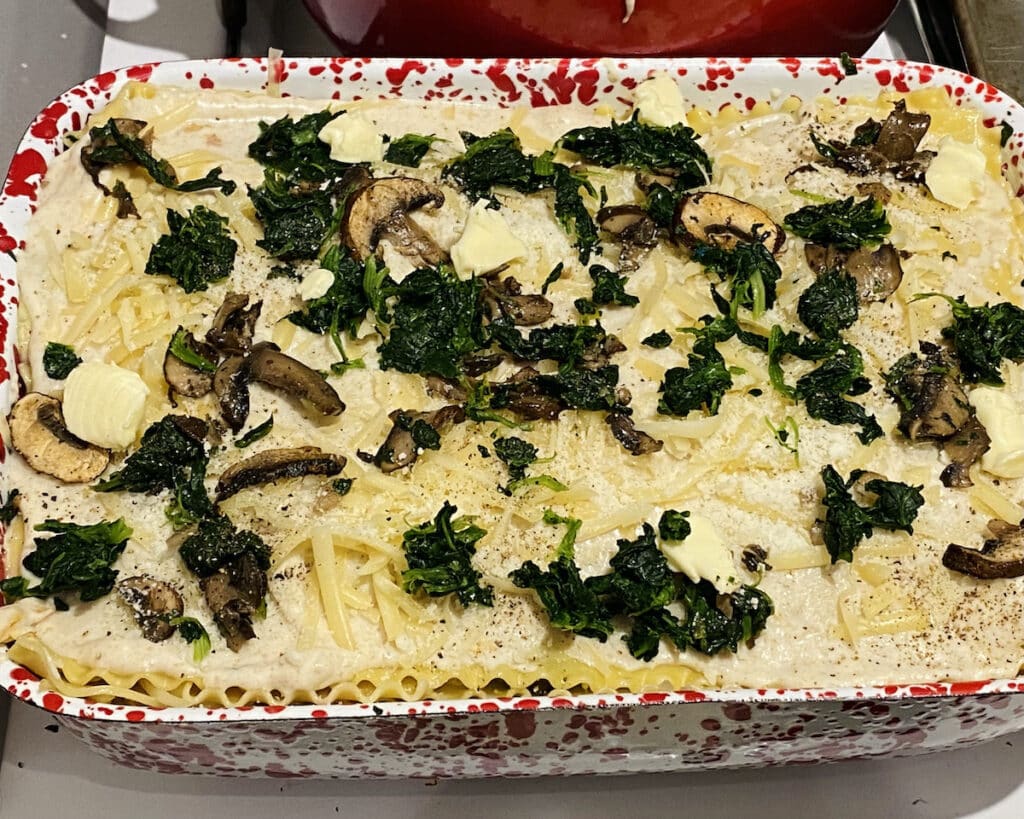
- Repeat the layering as many times as needed to use all the ingredients, plugging in the broken pieces of lasagna where needed to cover openings. Dot with a little butter.
- Bake the lasagna uncovered for 60 to 70 minutes or until the top is browned a bit and the sauce is bubbly. Remove from the oven and let it sit for about 20 minutes or so before cutting into it and serving to allow it to set.
- PRO-TIP: Be sure to let the lasagna sit for at least 20 minutes (and up to one hour, if possible) before serving. It is much easier to cut and portion after resting, and it should retain enough heat to serve as is.
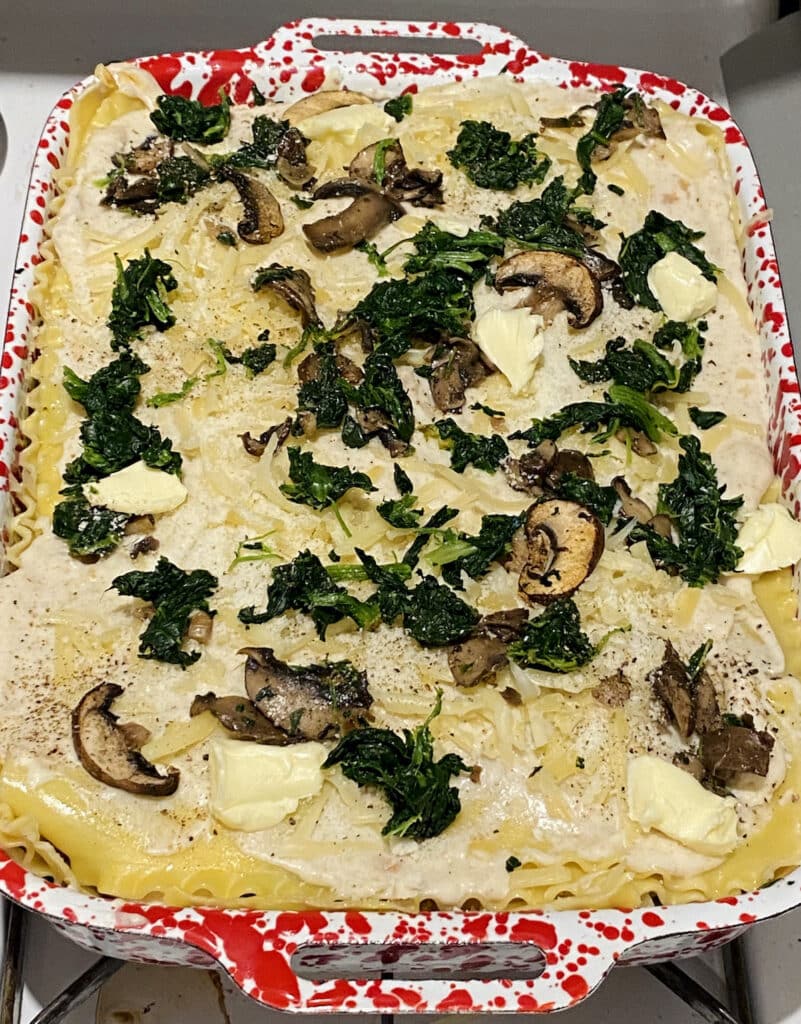
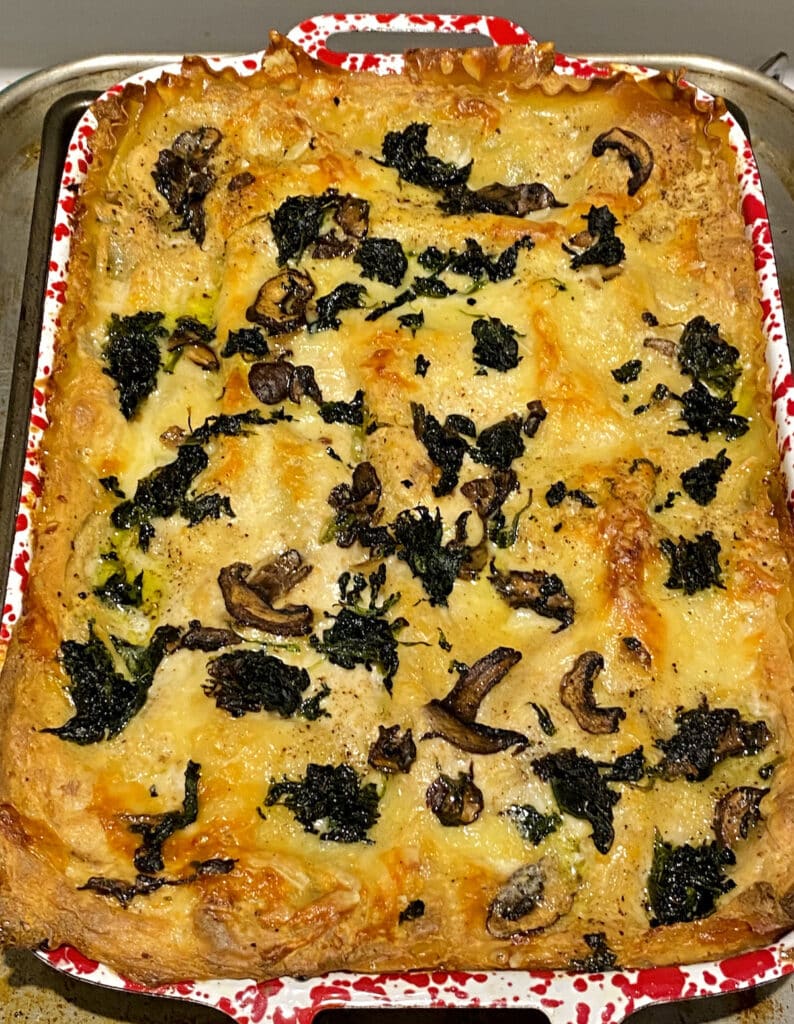
Frequently Asked Questions
Both rich, creamy béchamel (white sauce) and lighter tomato sauce are used in lasagnas of different origins. The traditional lasagne alla Bolognese that hails from the northern Italian region of Emilia-Romagna is made with béchamel and a slowly-cooked ragu meat sauce, while most classic Italian-American versions of lasagna are made with red sauce, ricotta and mozzarella cheeses. Both are so delicious!
The best ways to keep vegetable lasagna from getting soggy are by (1) never using uncooked vegetables as they will release a lot of water during baking, and (2) not using soggy ingredients or ingredients with excess liquid in the lasagna.
Most vegetables contain a high water content. And, if they are not cooked until dry, or strained properly before adding them to the lasagna, then the resulting baked lasagne may be soggy and not set properly.
In addition, if too many vegetables are used in the mixture, the lasagna may be soggy.
Finally, make sure your white sauce gets thick and creamy and is not runny. You just need to cook it long enough for this to happen.
Béchamel can be stored in an airtight container in the refrigerator for up to one week. In addition, it can be frozen for up to three months.
When ready to use, defrost white sauce in the refrigerator. It will likely appear watery and separated. Heat it slowly over low heat in a saucepan (do not boil) and whisk it to return to its original consistency. Use immediately.
Yes. The lasagna can be completely assembled, covered tightly in plastic wrap, and held in the refrigerator for up to two days prior to baking. Alternatively, you can freeze uncooked lasagna for three months prior to baking in a freezer-safe dish tightly wrapped in plastic. Defrost it in the refrigerator overnight. Then, remove the wrap and bake as per the recipe instructions. If it is not completely thawed, it will likely take longer than the recipe calls for to bake properly.
You can also bake the lasagna from its frozen state. In this case, add about 20 to 30 minutes to the baking time and cover it with foil for the first 30 minutes of baking.
Also, the béchamel and mushroom/spinach mixture can be prepared up to two days in advance and held in airtight containers in the refrigerator. If you do this, I suggest (1) slowly and carefully heating up the white sauce over low heat prior to assembly so that it is easier to spread, and (2) straining out any residual liquid that has accumulated in the veggie mixture.
Leftovers of white lasagna can be stored in an airtight container in the refrigerator for up to 3 days. Reheat them in a 350°F oven or a skillet, covered, over medium low heat with a little bit of water until heated through.
You can also freeze cooked lasagna. In fact, freezing individual portions of cooked lasagna is a great idea! Let it cool completely, then freeze it in an airtight container or freezer-safe dish for up to three months. Defrost it overnight in the refrigerator, then unwrap and reheat in a 375°F oven for 10 to 15 minutes or until heated through.

More Pasta Recipes with Veggies
- Pasta with Broccoli, Pecorino and Lemon
- Sicilian Pasta with Cauliflower, Pine Nuts, Raisins and Capers
- Pasta Sorrentina with Tomatoes, Basil and Fresh Mozzarella
- Trapanese Pesto with Busiate Pasta
- Bucatini with Slow-Roasted Eggplant, Tomatoes and Ricotta
Recipe Variations and for Vegetable Lasagna with Bechamel
Here are a few great suggestions for twists and additions to this Italian lasagna recipe:
- Add Other Veggies: Lots of different vegetables would work in this recipe, such as swiss chard, kale, roasted butternut squash, broccoli or cauliflower. The most important thing to remember is to always precook any vegetable before adding it to lasagna and make sure the cooked veggies are not watery or soggy as they will cause the resulting lasagne to be watery, soggy and not set well.
- Add protein: Pulled roasted chicken and crumbled, cooked Italian sausage would both be great additions to this dish for additional protein.
- Switch Out the Cheese: Lots of different cheeses, or a cheese blend, would work perfectly in this recipe. Some options are gruyère, gouda, mozzarella, taleggio and asiago.
- Roast the Mushrooms: If you prefer, you could turn this recipe into a roasted vegetable lasagna by roasting the mushrooms instead of sautéing.
- Add Heat: I have left red pepper flakes out of this recipe, but feel free to add as much as you like to the white sauce for a little kick.

Kitchen Tools for Vegetable Lasagna with Bechamel
To make this mushroom and spinach lasagna with white sauce, you’ll need the following:
- Measuring cups and spoons
- Cutting board with non-slip mat underneath (I use shelf liner)
- Sharp chef’s knife
- Multiple bowls to hold prep
- Wooden or silicon spoons, tongs
- Nutmeg grater
- Whisk
- Skimmer
- Ladle
- Cheese grater (optional)
- Large pot for cooking pasta
- Colander
- Large skillet or Dutch oven
- Baking dish
- Oven mitts

More Great Recipes to Try
I hope that you are enjoying Mangia With Michele and all of my Italian recipes!
If you’ve tried Vegetable Lasagna with Bechamel or another recipe here, please let me know in the comments below. I love hearing from you!
FOLLOW ME on FACEBOOK and INSTAGRAM to see more delicious food and what might be going on behind the scenes!
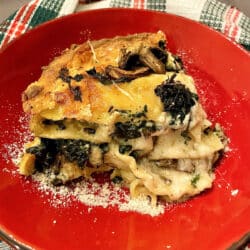
Creamy Mushroom and Spinach Vegetable Lasagna with Béchamel
Ingredients
- About 2 Tbsp butter or cooking spray to grease baking dish
For the Veggies:
- About 6 Tbsp butter
- ½ cup chopped garlic
- 2 pounds cremini or white mushrooms, thinly sliced
- 20 ounces frozen spinach leaves, defrosted and squeezed dry
- Pinch salt and black pepper
For the Béchamel/White Sauce:
- ½ cup butter (1 stick)
- ½ cup all purpose flour
- 8 cups whole milk
- 2 bay leaves
- Pinch nutmeg
- 1 small yellow onion, peeled but whole
- 4-6 cloves
- 1 cup grated Pecorino Romano cheese
- Pinch salt and pepper (white or black pepper)
For the Rest of the Lasagna:
- 1 pound lasagna noodles + salt for pasta water (about 24 noodles)
- Pinch olive oil
- 1 pound fontina cheese shredded on the large hole of box grater
- 1 cup grated Pecorino Romano cheese
Instructions
- Prep all ingredients according to specifications above. Bring a large pot filled with water to a boil for the pasta. Rub a deep 13”x9” baking dish thoroughly with about 2 Tbsp butter or coat with cooking spray and set aside.(Please see the section above in the blog post for Step-By-Step instructions with photos.)
- Prep the veggies: Melt 1/3 the butter in a Dutch oven, heavy-bottomed pot or large skillet over medium low heat and add the garlic, cooking it until soft and lightly browned. The, cook the mushrooms in batches (1/3 batch at a time) until tender and dry. The key with mushrooms is to not overcrowd the pan (otherwise they will steam) and to not stir them for about two minute or so once they have been added to the pan. Cook until the mushrooms are tender and dry, then add the defrosted and squeezed-dry spinach to the mushrooms, season with salt and pepper and mix well. Remove this mixture from pan and set aside. Strain out any residual liquid after it sits. (Excess liquid will create a soggy lasagna that does not set well.)About 6 Tbsp butter, ½ cup chopped garlic, 2 pounds cremini or white mushrooms,, 20 ounces frozen spinach leaves,, Pinch salt and black pepper
- Wipe the Dutch oven or skillet with a paper towel (or give it a quick rinse), then use it to prepare the béchamel/white sauce: Make a roux by melting butter in the Dutch oven or heavy-bottomed pot over medium heat. When the butter has melted, quickly whisk in the flour to incorporate and continue to stir/whisk for about 2-3 minutes until it develops a frothy, bubbly appearance and the floury taste has been cooked off. Do not let the roux brown. It should remain “blond”.½ cup butter, ½ cup all purpose flour
- Then, pour in the milk, bay leaves and nutmeg and reduce the heat to medium low. Stick the cloves into the onion and carefully place the onion in the milk. Bring the mixture to a simmer and let it simmer for about 15-20 minutes to allow the sauce to thicken and the flour sauce to be cooked off. Stir regularly to prevent lumps, taking care not to burn it.8 cups whole milk, 2 bay leaves, Pinch nutmeg, 1 small yellow onion,, 4-6 cloves
- Once the milk is thick enough to coat the back of a spoon (see photo above), remove and discard the onion and bay leaves and use a skimmer to remove any lumps. The sauce should be dense and creamy. Turn the heat off and whisk in the Pecorino cheese, along with a pinch of salt and pepper. Set the pot with the white sauce aside while you cook the pasta.1 cup grated Pecorino Romano cheese, Pinch salt and pepper
- Arrange a rack in the middle of the oven and preheat it to 350℉.
- Once the water has come to a boil, add salt then the lasagna noodles and a splash of olive oil and cook until 3 minutes less that the package directions. Drain the noodles very well, then lay them flat in a single layer on a sheet pan. Spray them with a bit more oil and set them aside. You will likely have some breakage and this is ok. Keep these pieces as they will come in handy to patch the layers of lasagna.1 pound lasagna noodles, Pinch olive oil
- Now that all of the components are ready, it’s time to assemble the lasagna. Gather the greased baking pan, white sauce (give it a stir), cooked lasagna noodles, spinach/mushroom mixture, and the grated fontina and pecorino cheeses. Be sure to strain out and discard any excess liquid that has accumulated in the cooked veggies.)1 pound fontina cheese, 1 cup grated Pecorino Romano cheese
- Assemble the lasagna in layers as follows, each component being spread out over the entire surface of the layer below it:• Spread about 1 cup white sauce over the bottom surface;• Then add 4-5 lasagna noodles;• Then about 1 cup white sauce again;• Then about heaping ½ cup spinach/mushroom mixture;• Then about heaping ½ cup grated fontina cheese;• Then a pinch of grated pecorino.
- Repeat the layering as many times as needed to use all the ingredients, plugging in the broken pieces of lasagna where needed to cover openings. Dot with any remaining butter (about 2-3 Tbsp).
- Bake the lasagna uncovered for 60 to 70 minutes or until the top is browned a bit and the sauce is bubbly. Remove from the oven and let it sit for about 20 minutes or so before cutting into it and serving to allow it to set. Buon Appetito!
Notes
- The béchamel recipe makes about 7 cups white sauce.
- This recipe calls for a 9”x13” pan or baking/casserole dish that should be about 2.5” deep to hold all the layers. If necessary or desired, use a larger pan for less layers or break this up into two smaller pans. I have a friend that swears by making lasagna in a loaf pan, which is a great idea!
- If you prefer, you can leave the onion, cloves and bay leaf out of the white sauce as their flavor is subtle.
- The milk does not need to be heated before adding it to the roux. It is proper technique to add a cold liquid to a hot roux.
- While I would almost never suggest adding oil to pasta water (since it reduces the adherence of sauce to pasta), this is one of the only exceptions for it. Long, flat pasta, such as these lasagna noodles, have a tendency to stick together when they cook and rest and the oil will help prevent that.
- Be sure to let the lasagna sit for at least 20 minutes (and up to one hour, if possible) before serving. As good as it will look and smell once it comes out of the oven, if you cut into it immediately, it will be a big mess. It is much easier to cut and portion after resting, and it should retain enough heat to serve as is. If you prefer, you can always pop it back in the oven for 10 to 15 minutes.
- The lasagna can be completely assembled, covered tightly in plastic wrap, and held in the refrigerator for up to two days prior to baking. Alternatively, it can be frozen for three months prior to baking in a freezer-safe dish tightly wrapped in plastic. Defrost it in the refrigerator overnight. Then, remove the wrap and bake as per the recipe instructions. If it is not completely thawed, it will likely take longer than the recipe calls for to bake properly.
- You can also bake the lasagna from its frozen state. In this case, add about 20 to 30 minutes to the baking time and cover it with foil for the first 30 minutes of baking.
- The béchamel and mushroom/spinach mixture can be prepared up to two days in advance and held in airtight containers in the refrigerator. If you do this, I suggest (1) slowly and carefully heating up the white sauce over low heat prior to assembly so that it is easier to spread, and (2) straining out any residual liquid that has accumulated in the veggie mixture.
- Leftovers can be stored in an airtight container in the refrigerator for up to 3 days. Reheat them in a 350°F oven or a skillet, covered, over medium low heat with a little bit of water until heated through.
- You can also freeze cooked lasagna. In fact, freezing individual portions of cooked lasagna is a great idea! Let it cool completely, then freeze it in an airtight container or freezer-safe dish for up to three months. Defrost it overnight in the refrigerator, then unwrap and reheat in a 375°F oven for 10 to 15 minutes or until heated through.

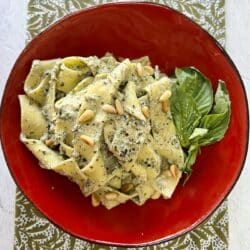
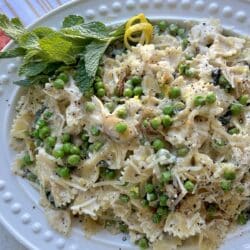

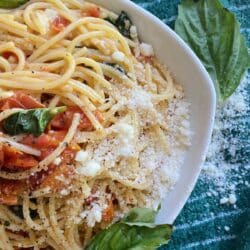
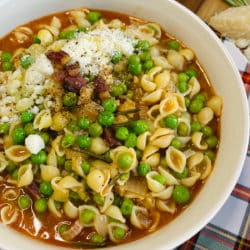
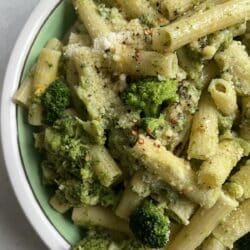

The mushroom/spinach vegetable lasagna was a big hit with my family, especially with my adult vegetarian children. No guess work following mangiawithmichele recipes – laid out and explained beautifully! This recipe is a keeper!
I can’t believe how delicious this lasagna was! Everyone at the table was raving about it!